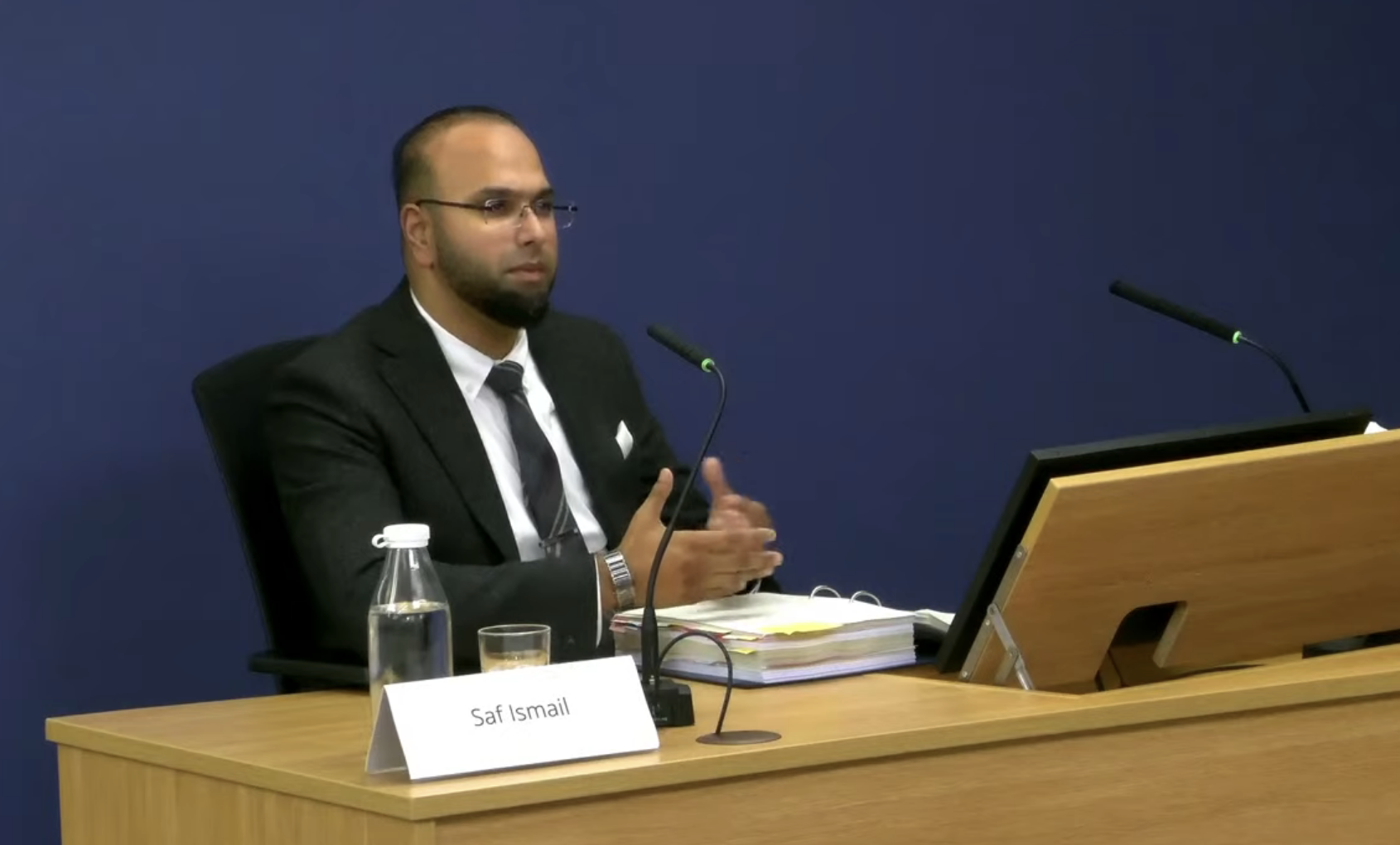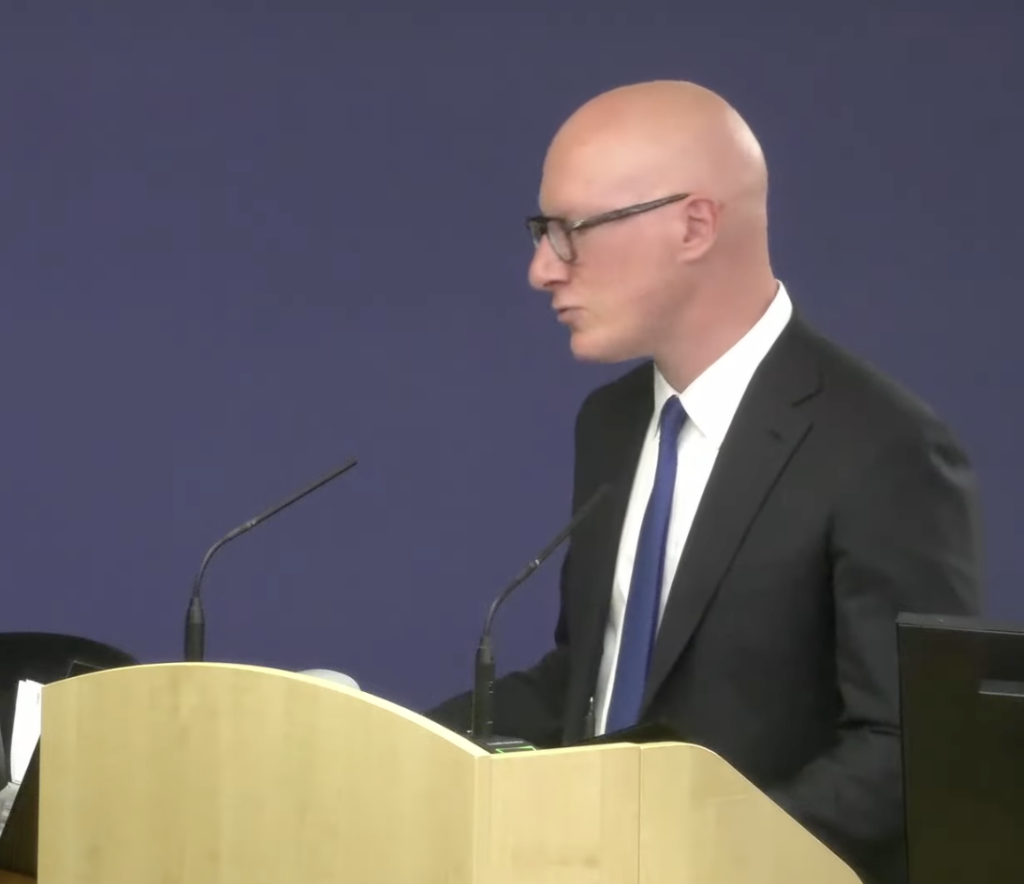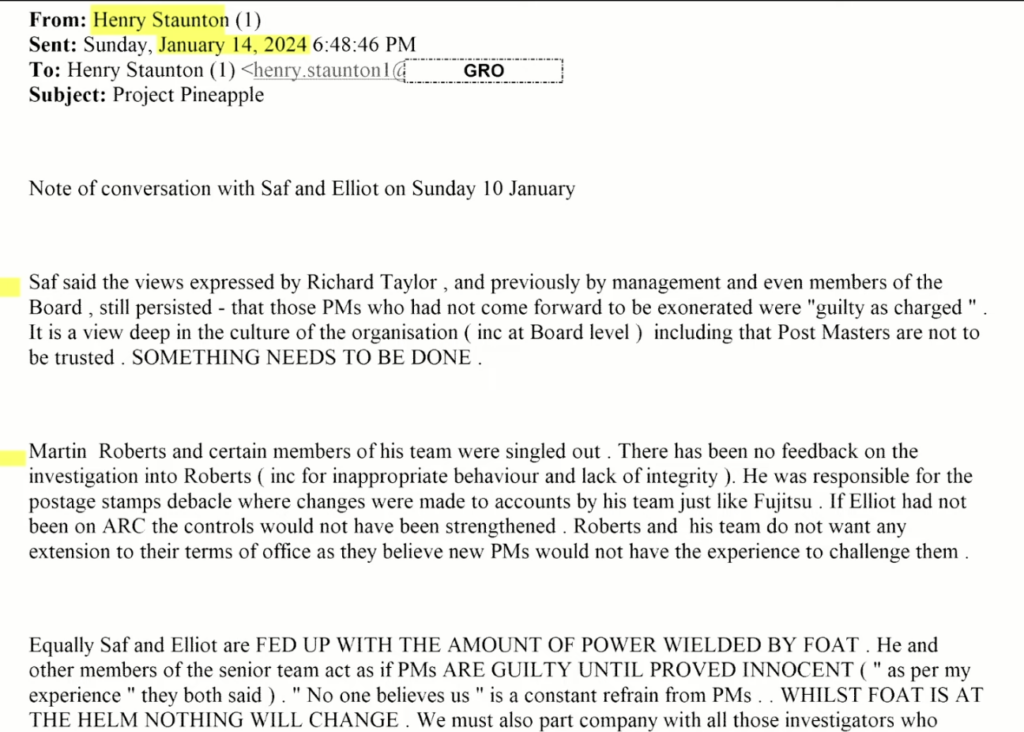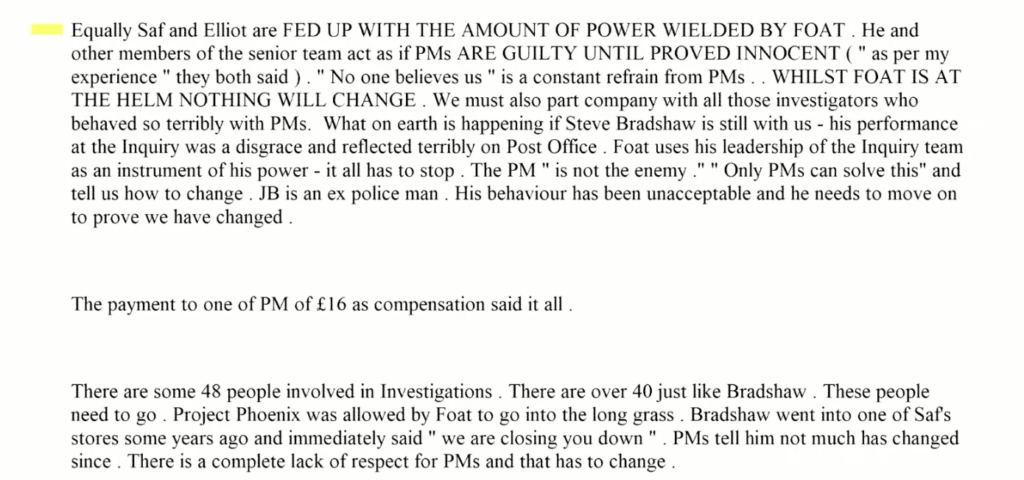
The utter dysfunction of the Post Office as an organisation has been laid bare by one of its serving directors. Saf Ismail was one of two Subpostmasters (the other being Elliot Jacobs) appointed to the Post Office board in 2021.
Ismail appears to be a decent man, wholly unprepared for the mediocre, venal nature of the people he found himself dealing with once he joined the Post Office board. At the moment both he and his business (which runs seven branches and a banking hub) is currently under investigation by the Post Office for undisclosed reasons. He has therefore stepped back from being a board member whilst the investigation is ongoing. That was all the information disclosed by the Inquiry.
Ismail described the Post Office as “so bureaucratic, to get anything done just takes a very long time”. This would be unhelpful at the best of times, but right now, according to Ismail “there’s so many fires… within this organisation that need putting out.”
Recalling joining the board, Ismail told the Inquiry “The NEDs [Non-Executive Directors]… were welcoming and were hospitable, however the wider executive made it difficult… we didn’t feel as welcomed”.
Though welcoming, the NEDs don’t appear to know what they’re doing, or, as Ismail says in his witness statement:
“the board have a limited level of operational understanding required to challenge the executive, as board members do not have frontline Post Office experience and, as such, they do not fully appreciate the complexities and challenges PMs [Subpostmasters] face. The only individuals with any operational nous or understanding of PM economics are myself and Mr Jacobs.”
It is perhaps unsurprising that Post Office execs, rather than welcome Ismail and Jacobs’ operational understanding, saw their expertise as a threat. Ismail said that in early 2023 the Post Office’s Chief People Officer, Jane Davies told Ismail that the Post Office CEO Nick Read “was not happy with… postmasters being on the board because we were too awkward, too challenging and that he wanted that to be reversed”.
Mushroom Men
Ismail claims that he and Jacobs were deliberately kept in the dark by the board and executive about key decisions being made by the business.
“Up until recently,” he said, “we were not provided access to any of the other committee documents that we were not on…. when I spoke to the previous Chair, Henry [Staunton], and to Jane Davies, they particularly mentioned how the wider Executive ensured myself and Mr Jacobs were blocked out of meetings that involved talking about bonuses and salaries. We were actively excluded from their meetings.”
Ismail and Jacobs were keen to ensure a greater board-level understanding of the Subpostmasters’ concerns (which, in a way, is their job) and so proposed bringing forward the appointment of their successors and having an 18-month handover. This was rejected.
Tail wagging the dog
Ismail painted a picture of an executive team which felt empowered enough to ignore its own board, referring specifically to the appointments process:
“There’s been occasions when Board members have been invited to conduct interviews for very senior roles, highly paid senior roles within the organisation, and the Board members who are part of the panel, this is their skillset, they know what they are looking for. And when the interviews have been conducted, the Board members made it very, very clear that it should be candidate A, out of A, B, C, D, for example. However, the wider Executive has then totally ignored that advice, providing no reasoning whatsoever, and then gone and recruited candidate B.”
Ismail named the appointment of Chief Retail Officer, Martin Roberts, as a specific example of this. Roberts apparently later turned out to be, in Ismail’s view “not good enough”. Ismail also claimed the Executive chose what information they fed the board in order to get the decisions they wanted. He told the Inquiry this led to the board making bad decisions which cost the business money.
Julian Blake, who questioned Ismail on behalf of the Inquiry, asked if there were parts of the executive doing this repeatedly. Ismail said: “Yes, I feel procurement is particularly poor, legal is extremely poor”.

Damningly, Ismail alleged that the key driver of actions and attitudes at the Post Office is its bonus culture. In his witness statement, Ismail wrote:
“senior leaders within POL [Post Office Ltd] are obsessed with their remuneration. I have seen an unhealthy and unjustified obsession with bonuses and remuneration within POL.”
Ismail said this led to decisions which harmed the business, writing:
“the previous POL Head of IT, Jeff Smyth, was due to receive a bonus linked to delivery of a programme to exit POL’s Belfast data centres. This programme was, in my view, a waste of public money approximately in the region of £35 million… the executive tried to deliver this project at any cost to release bonuses.”
If this is true, it’s borderline fraudulent.
The Untouchables
Most of the rest of the afternoon was taken up with a discussion about the Post Office’s habit of hanging on to its bad apples in the legal, retail and investigations team, or, worse, allowing them to leave the business, and then re-hiring them as contractors to work on historic Postmaster cases, much to the alarm of the Postmasters they’d screwed over.
Ismail said these people were described by Nick Read as “The Untouchables” because “there’s no accountability for them… they were untouchable because there’d been complaints, there’d been various points where, for example, on the legal team side, on the past roles side, it just wasn’t moving quick enough, and there was no performance management, no accountability.”
Earlier this year, in the light of comments made by the Post Office Director of Communications, Jacobs and Ismail sought a meeting with the then Post Office Chair, Henry Staunton. Jacobs had recently been placed under investigation by the Post Office and both men were angry. Staunton’s note of the meeting was shown to the Inquiry.

The Foat mentioned in the note is Ben Foat, the former Post Office General Counsel and head of the legal department, who has subsequently stood down from his role to prepare his evidence for this phase of the Inquiry.
There’s more…

The reference in the above note to “JB” is to John Bartlett, the current head of the Post Office investigations unit. Ismail told the Inquiry told the Inquiry that Project Phoenix was an internal investigation into the actions of various Post Office staff who behaved abominably during the scandal with a view to ensuring they couldn’t continue to damage Postmasters or the Post Office itself. Steve Bradshaw was a case in point. Bradshaw was the first person to give evidence to the Inquiry this year after the screening of the ITV drama Bates v Post Office. Dressed entirely in black, Bradshaw gave a disastrous performance, coming across like a small-minded bully.
Ismail told Blake:
“In terms of Steve Bradshaw, I did mention at at least two to three Board meetings, towards the back end of ’23 that the business needs to be prepared for what’s coming out and, again, [I was] ignored. And then once Steve Bradshaw gave testimony, the Board and the wider executive were “How is Steve still in the business? What’s going on? Why have we not dealt with this?” And that’s providing you some context in terms of where the long grass came from because we thought it should have been dealt with.”
Staunton circulated his note to Ismail and Jacobs and asked if it was correct and whether he could send it in confidence to Nick Read (who I’m told was sitting in the Inquiry watching Ismail give evidence). Ismail and Jacobs men agreed. Read forwarded the note to Steve Bradshaw and Martin Roberts.
Ismail continues to give evidence today, and will be followed by his Subpostmaster NED colleague, Elliot Jacobs.
The journalism on this blog is crowdfunded. If you would like to join the “secret email” newsletter, please consider making a one-off donation. The money is used to keep the contents of this website free. You will receive irregular, but informative email updates about the Post Office Horizon IT scandal.

Leave a Reply